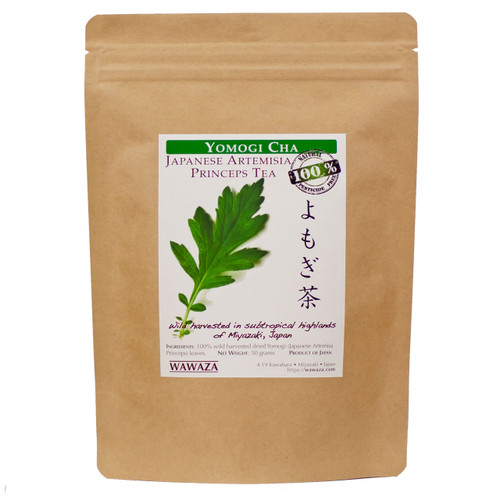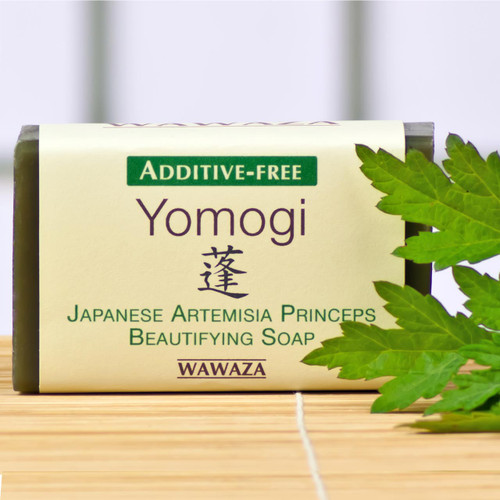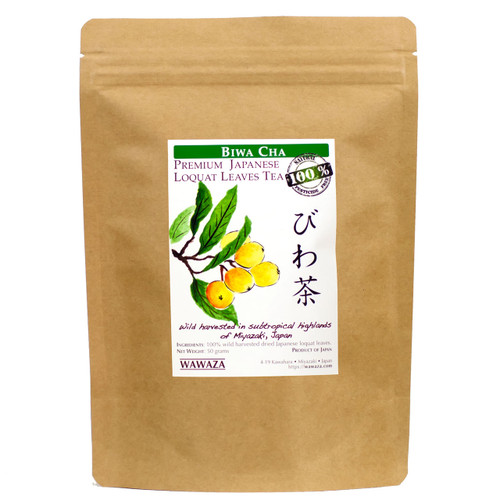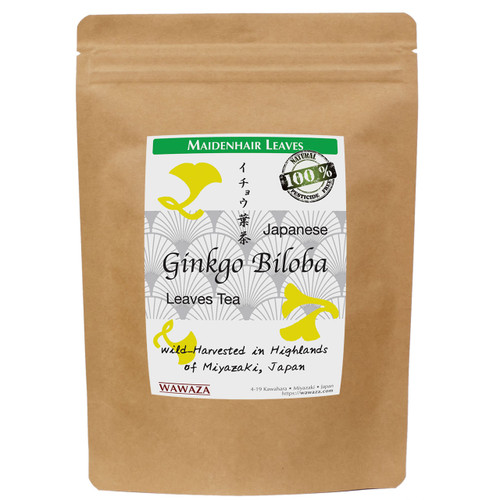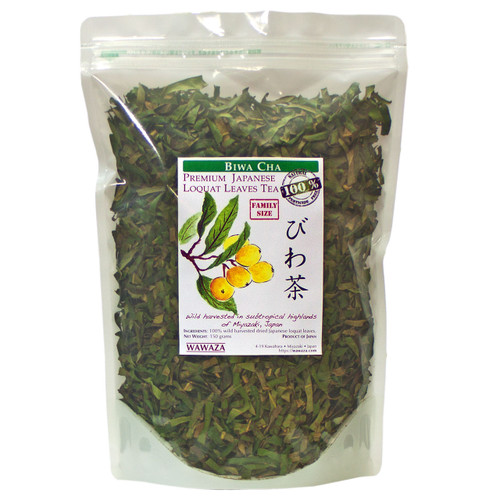With its hints of grassy-lemony undertones and refreshing, spring-like aroma, this invigorating traditional Japanese tea is a delightful combination of taste and aroma.
The Japanese have revered Yomogi Cha as an elixir of beauty and gynecological health since ancient times.
The wild-harvested Yomogi leaves that make up this tea are rich in diverse range of antioxidants with potent anti-aging, anti-inflammatory, and cancer-fighting properties. See references at the bottom of this page for more detailed information.
- ❤ Boost skin's renewal cycle
- ❤ Alleviate inflammatory skin conditions
- ❤ Improve tone and diminish age spots
- ❤ Relieve cramps and irregular periods
- ❤ Guard against breast and cervical cancer
- ❤ Enhance hormonal balance and increase reproductive health
Easy to prepare.Serve hot, cold or over ice.
Wild-Harvested • All-Natural
Pesticide-free. Freshly-picked sun-dried leaves, uncrushed for optimal quality.
About Yomogi
Japanese have a love affair with yomogi. Besides making tea, they use it to make sweet mochi rice cakes (yomogi-mochi), to take baths (yomogi-yu), put it in soaps (yomogi-sekken). and steam it for making a sauna for ladies (yomogi-mushi.)
Cosmetic manufacturers use the extract of yomogi leaves in anti-aging and skin-beautifying formulations. The antioxidant, anti-inflammatory, and anti-cancer properties of yomogi are subjects of intense scientific interest (see references below.)
The tradition began in Japan's Asuka period (538-710 AD) by Empress Suiko (Suiko-tennō), the first female and the 33rd monarch of Japan and an accomplished herbalist.
Empress Suiko designated May 5th as the royal expedition day for collecting fresh irises and yomogi leaves and encouraged the public to visit the countryside to do the same.
How to Brew Yomogi Tea
Quick Brew Method
The following instructions are for making 4 cups (800 ml total.)
- Add 5 grams (2 heaping tablespoons) of yomogi leaves to a pot.
- Add 4 cups of near-boiling water.
- Brew for about 3 minutes.
- Strain and serve hot, cold or over ice.
Senjiru Brew Method
Senjiru is a traditional Japanese technique for yielding a deeper infusion.
- Pour a little more than 4 cups of cold water into a pot.
- Add 2 heaping tablespoons of yomogi leaves.
- Heat to a full, rolling boil.
- Turn heat down and simmer for 10 minutes.
- Turn heat off and wait for 10 minutes.
- Strain and serve.
REFERENCES
- Inhibitory effect of eupatilin and jaceosidin isolated from Artemisia princeps in IgE-induced hypersensitivity -- International Immunopharmacology. V 7, Issue 13, 15 Dec 2007, pp 1678–1684
- Anti-inflammatory effects of Artemisia princeps in antigen-stimulated T cells and regulatory T cells.-- Journal of Pharmacy and Pharmacology. V 61, Issue 8, pp 1043–1050, Aug 2009
- In Vitro antioxidant and anti-inflammatory activities of Jaceosidin from Artemisia princeps Pampanini cv. Sajabal -- Archives of Pharmacal Research. Apr 2008, V 31, Issue 4, pp 429-437
- Artemisia leaf extract induces apoptosis in human endometriotic cells through regulation of the p38 and NFκB pathways -- Article in Journal of Ethnopharmacology 145(3), Dec 2012
- Jaceosidin, Isolated from dietary mugwort (Artemisia princeps), Induces G2/M cell cycle arrest by inactivating cdc25C-cdc2 via ATM-Chk1/2 activation -- Food and Chemical Toxicology V 55, May 2013, pp 214–221
- Eupafolin, a flavonoid isolated from Artemisia princeps, induced apoptosis in human cervical adenocarcinoma HeLa cells -- Molecular Nutrition & Food Research. 54(9) pp 1318-28, Sep 2010
- Artemisia Princeps Induces Apoptosis in Cervical Cancer Cells -- Journal of Chengdu University of Traditional Chinese Medicine. 2015-01
- Investigation of Medicinal Substances from in vitro Cultured Cells and Leaves of Artemisia princeps var. Orientalis -- Korean Journal of Medicinal Crop Science. Volume 13, Issue 3, 2005, pp.69-76.
- Artemisia princeps var orientalis induces apoptosis in human breast cancer MCF-7 cells -- Anticancer Research. 2007 Nov-Dec;27(6B): pp 3891-8.
- Induction of Apoptosis by Yomogin in Human Promyelocytic Leukemic HL-60 Cells -- Biological and Pharmaceutical Bulletin. Vol. 27 (2004) No. 7 P 1106-1111
- Synergistic induction of 1,25-dihydroxyvitamin D(3)- and all-trans-retinoic acid-induced differentiation of HL-60 leukemia cells by yomogin, a sesquiterpene lactone from Artemisia princeps -- Planta Medica. Volume 68, Issue 10, pp 886-890, Oct 2002
- Nihon Shoki (日本書紀), The Chronicles of Japan -- Scroll 22 (Empress Suiko), 19th year, fifth month.
7 Reviews Hide Reviews Show Reviews
-
The best herbal tea flavor I had
This is a lovely tea. It's mellow, but the flavor is excellent. Hard to describe. I enjoyed the ritual of making this tea very much. Every time I would make it, my husband would smell the fragrance in another room and ask for some. :)
-
Great
Best
-
Satisfied
I really like this tea. It has a herbal fresh taste and you sense it is doing you good as you drink it. And the amount is generous. The package arrived much sooner than i anticipated.
-
artemisia princess tea
Lovely fragrant relaxing enjoyment
-
Delicious
Love having this tea in the morning, it is nice and light. Wawaza even included a few gifts for me, which was super nice.
-
Delicious and Healthy
Delicious and Healthy , great for your skin. I love this company, all their products are top notch. Packaging is just beautiful, including the little gift they include. I enjoy this with the Detox tea.
-
Wonderfully refreshing
This tea is delicious. It has a greeny-lemony taste, very fresh and reviving. Unusual but good. Healthful and enjoyable.

